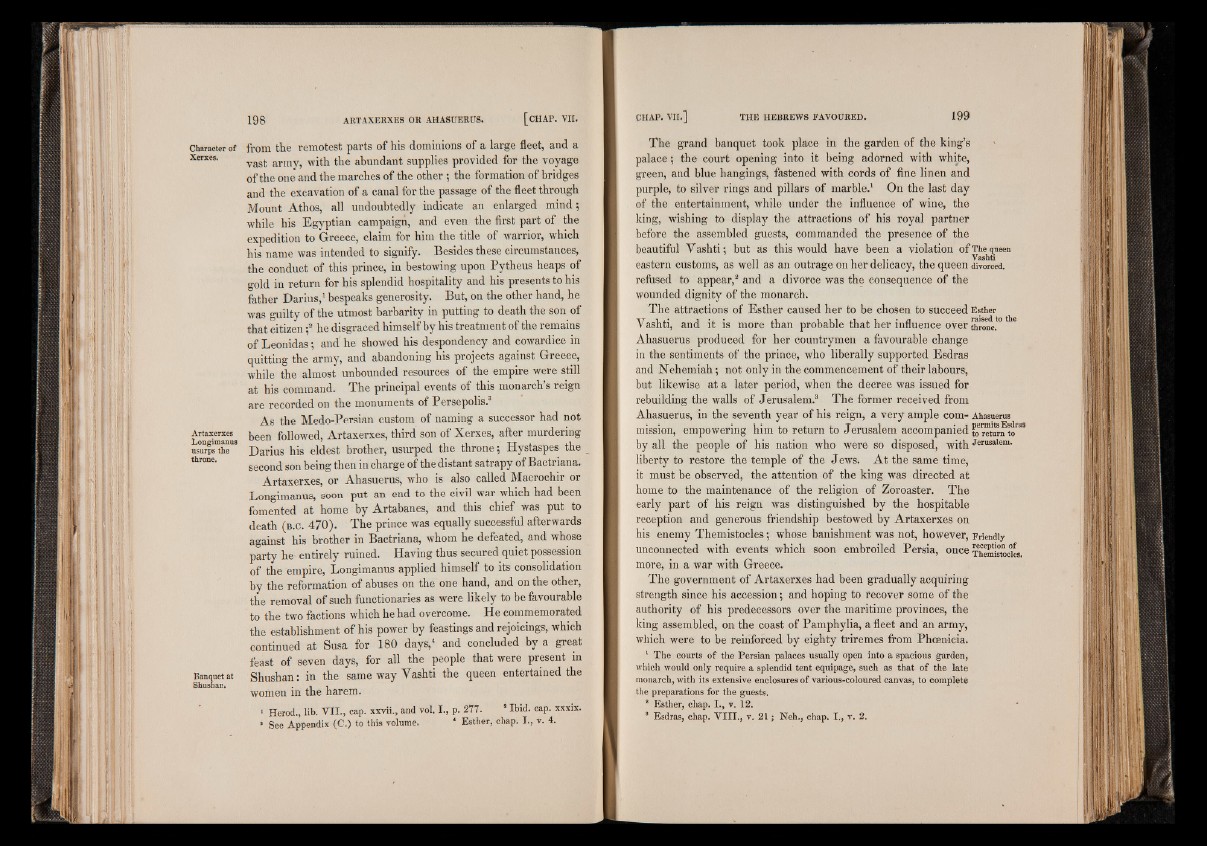
Character of
Xerxes.
Artaxerxes
Longimanus
usurps the
throne.
Banquet at
Shushan.
from the remotest parts of his dominions of a large fleet, and a
vast army, with the abundant supplies provided for the voyage
of the one and the marches of the other ; the formation of bridges
and the excavation of a canal for the passage of the fleet through
Mount Athos, all undoubtedly indicate an enlarged mind;
while his Egyptian campaign, and even the first part of the
expedition to Greece, claim for him the title of warrior, which
his name was intended to signify. Besides these circumstances,
the conduct of this prince, in bestowing upon Pytheus heaps of
gold in return for his splendid hospitality and his presents to his
father Darius,1 bespeaks generosity. But, on the other hand, he
was guilty of the utmost barbarity in putting to death the son of
that citizen f he disgraced himself by his treatment of the remains
of Leonidas *, and' he showed his despondency and cowardice in
quitting the army, and abandoning his projects against Greece,
while the almost unbounded resources of the empire were still
at his command. The principal events of this monarch’s reign
are recorded on the monuments of Persepolis.3
As the Medo-Persian custom of naming a successor had not
been followed, Artaxerxes, third son of Xerxes, after murdering
Darius his eldest brother, usurped the throne; Hystaspes the
second son being then in charge of the distant satrapy of Bactriana.
Artaxerxes, or Ahasuerus, who is also called Macrochir or
Longimanus, soon put an end to the civil war which had been
fomented at home by Artabanes, and this chief was put to
death ( b .c . 470). The prince was equally successful afterwards
against his brother in Bactriana, whom he defeated, and whose
party he entirely ruined. Having thus secured quiet possession
of the empire, Longimanus applied himself to its consolidation
by the reformation of abuses on the one hand, and on the other,
the removal of such functionaries as were likely to be favourable
to the two factions which he had overcome. He commemorated
the establishment of his power by feastings and rejoicings, which
continued at Susa for 180 days,4 and concluded by a great
feast of seven days, for all the people that were present in
Shushan: in the same way Vashti the queen entertained the
women in the harem.
1 Herod., lib. V I I ., cap. xxvii., and vol. I., p. 277. 8 Ibid. cap. xxxix.
* See Appendix (C.) to this volume. 4 Esther, chap. I., v. 4.
The grand banquet took place in the garden of the king’s
palace; the court opening into it being adorned with white,
green, and blue hangings, fastened with cords of fine linen and
purple, to silver rings and pillars of marble.1 On the last day
of the entertainment, while under the influence of wine, the
king, wishing to display the attractions of his royal partner
before the assembled guests, commanded the presence of the
beautiful Yashti; but as this would have been a violation of The queen
eastern customs, as well as an outrage on her delicacy, the queen divorced,
refused to appear,2 and a divorce was the consequence of the
wounded dignity of the monarch.
The attractions of Esther caused her to be chosen to succeed Esther
Yashti, and it is more than probable that her influence over throne.*” the
Ahasuerus produced for her countrymen a favourable change
in the sentiments of the prince, who liberally supported Esdras
and Nehemiah; not only in the commencement of their labours,
but likewise at a later period, when the decree was issued for
rebuilding the walls of Jerusalem.3 The former received from
Ahasuerus, in the seventh year of his reign, a very ample com- Ahasuerus
1 • , „ . . T — „ mission, empowering him to return to 1 • i permits EsdraS J erusalem accompanied £<, return to
by all the people of his nation who were so disposed, withJerusalem-
liberty to restore the temple of the Jews. At the same time,
it must be observed, the attention of the king was directed at
home to the maintenance of the religion of Zoroaster. The
early part of his reign was distinguished by the hospitable
reception and generous friendship bestowed by Artaxerxes on
his enemy Themistocles; whose banishment was not, however, Friendly
unconnected with events which soon embroiled Persia, once Themistocles,
more, in a war with Greece.
The government of Artaxerxes had been gradually acquiring
strength since his accession; and hoping to recover some of the
authority of his predecessors over the maritime provinces, the
king assembled, on the coast of Pamphylia, a fleet and an army,
which were to be reinforced by eighty triremes from Phoenicia.
1 The courts of the Persian palaces usually open into a spacious garden,
which would only require a splendid tent equipage, such as that of the late
monarch, with its extensive enclosures of various-coloured Canvas, to Complete
the preparations for the guests.
8 Esther, chap. I ., v. 12.
8 Esdras, chap. V I I I ., v. 21 ; Neh., chap. I ., v. 2.